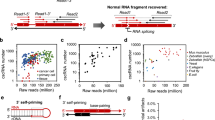Abstract
Chimeric RNAs can be formed by trans-splicing from different transcripts or cis-splicing of adjacent genes (cis-SAGe). Cis-SAGe results from read-through transcription of two neighbor genes. To investigate the mechanisms underlying intergenic splicing of adjacent genes, it is important to develop an assay to detect transcriptional read-through. Here, we describe a general RT-PCR based method to confirm the process for cis-SAGe candidates. In this method, we use PCR to amplify cDNA that is reverse transcribed from the read-through precursor mRNA. The result provides a foundation for further downstream mechanistic studies.
Access this chapter
Tax calculation will be finalised at checkout
Purchases are for personal use only
Similar content being viewed by others
References
Rabbitts TH (1994) Chromosomal translocations in human cancer. Nature 372:143–149. https://doi.org/10.1038/372143a0
Rowley JD (1999) The role of chromosome translocations in leukemogenesis. Semin Hematol 36:59–72
Yuan H, Qin F, Movassagh M, Park H, Golden W, **e Z, Zhang P, Sklar J, Li H (2013) A chimeric RNA characteristic of rhabdomyosarcoma in normal myogenesis process. Cancer Discov 3:1394–1403. https://doi.org/10.1158/2159-8290.CD-13-0186
Velusamy T, Palanisamy N, Kalyana-Sundaram S, Sahasrabuddhe AA, Maher CA, Robinson DR, Bahler DW, Cornell TT, Wilson TE, Lim MS, Chinnaiyan AM, Elenitoba-Johnson KS (2013) Recurrent reciprocal RNA chimera involving YPEL5 and PPP1CB in chronic lymphocytic leukemia. Proc Natl Acad Sci U S A 110:3035–3040. https://doi.org/10.1073/pnas.1214326110
Li H, Wang J, Mor G, Sklar J (2008) A neoplastic gene fusion mimics trans-splicing of RNAs in normal human cells. Science 321:1357–1361. https://doi.org/10.1126/science.1156725
Lai J, Lehman ML, Dinger ME, Hendy SC, Mercer TR, Seim I, Lawrence MG, Mattick JS, Clements JA, Nelson CC (2010) A variant of the KLK4 gene is expressed as a cis sense-antisense chimeric transcript in prostate cancer cells. RNA 16:1156–1166. https://doi.org/10.1261/rna.2019810
Li H, Wang J, Ma X, Sklar J (2009) Gene fusions and RNA trans-splicing in normal and neoplastic human cells. Cell Cycle 8:218–222. https://doi.org/10.4161/cc.8.2.7358
Zhang Y, Gong M, Yuan H, Park HG, Frierson HF, Li H (2012) Chimeric transcript generated by cis-splicing of adjacent genes regulates prostate cancer cell proliferation. Cancer Discov 2:598–607. https://doi.org/10.1158/2159-8290.CD-12-0042
Parra G, Reymond A, Dabbouseh N, Dermitzakis ET, Castelo R, Thomson TM, Antonarakis SE, Guigo R (2006) Tandem chimerism as a means to increase protein complexity in the human genome. Genome Res 16:37–44. https://doi.org/10.1101/gr.4145906
Akiva P, Toporik A, Edelheit S, Peretz Y, Diber A, Shemesh R, Novik A, Sorek R (2006) Transcription-mediated gene fusion in the human genome. Genome Res 16:30–36. https://doi.org/10.1101/gr.4137606
Siepel A, Diekhans M, Brejova B, Langton L, Stevens M, Comstock CL, Davis C, Ewing B, Oommen S, Lau C, Yu HC, Li J, Roe BA, Green P, Gerhard DS, Temple G, Haussler D, Brent MR (2007) Targeted discovery of novel human exons by comparative genomics. Genome Res 17:1763–1773. https://doi.org/10.1101/gr.7128207
Kannan K, Wang L, Wang J, Ittmann MM, Li W, Yen L (2011) Recurrent chimeric RNAs enriched in human prostate cancer identified by deep sequencing. Proc Natl Acad Sci U S A 108:9172–9177. https://doi.org/10.1073/pnas.1100489108
Kumar-Sinha C, Kalyana-Sundaram S, Chinnaiyan AM (2012) SLC45A3-ELK4 chimera in prostate cancer: spotlight on cis-splicing. Cancer Discov 2:582–585. https://doi.org/10.1158/2159-8290.CD-12-0212
Qin F, Song Z, Babiceanu M, Song Y, Facemire L, Singh R, Adli M, Li H (2015) Discovery of CTCF-sensitive Cis-spliced fusion RNAs between adjacent genes in human prostate cells. PLoS Genet 11:e1005001. https://doi.org/10.1371/journal.pgen.1005001
Babiceanu M, Qin F, **e Z, Jia Y, Lopez K, Janus N, Facemire L, Kumar S, Pang Y, Qi Y, Lazar IM, Li H (2016) Recurrent chimeric fusion RNAs in non-cancer tissues and cells. Nucleic Acids Res 44:2859–2872. https://doi.org/10.1093/nar/gkw032
Wu P, Yang S, Singh S, Qin F, Kumar S, Wang L, Ma D, Li H (2018) The landscape and implications of chimeric RNAs in cervical cancer. EBioMedicine 37:158–167. https://doi.org/10.1016/j.ebiom.2018.10.059
Author information
Authors and Affiliations
Corresponding author
Editor information
Editors and Affiliations
Rights and permissions
Copyright information
© 2020 Springer Science+Business Media, LLC, part of Springer Nature
About this protocol
Cite this protocol
Shi, X., Qin, F., Li, H. (2020). Confirmation of Transcriptional Read-Through Events by RT-PCR. In: Li, H., Elfman, J. (eds) Chimeric RNA. Methods in Molecular Biology, vol 2079. Humana, New York, NY. https://doi.org/10.1007/978-1-4939-9904-0_14
Download citation
DOI: https://doi.org/10.1007/978-1-4939-9904-0_14
Published:
Publisher Name: Humana, New York, NY
Print ISBN: 978-1-4939-9903-3
Online ISBN: 978-1-4939-9904-0
eBook Packages: Springer Protocols




